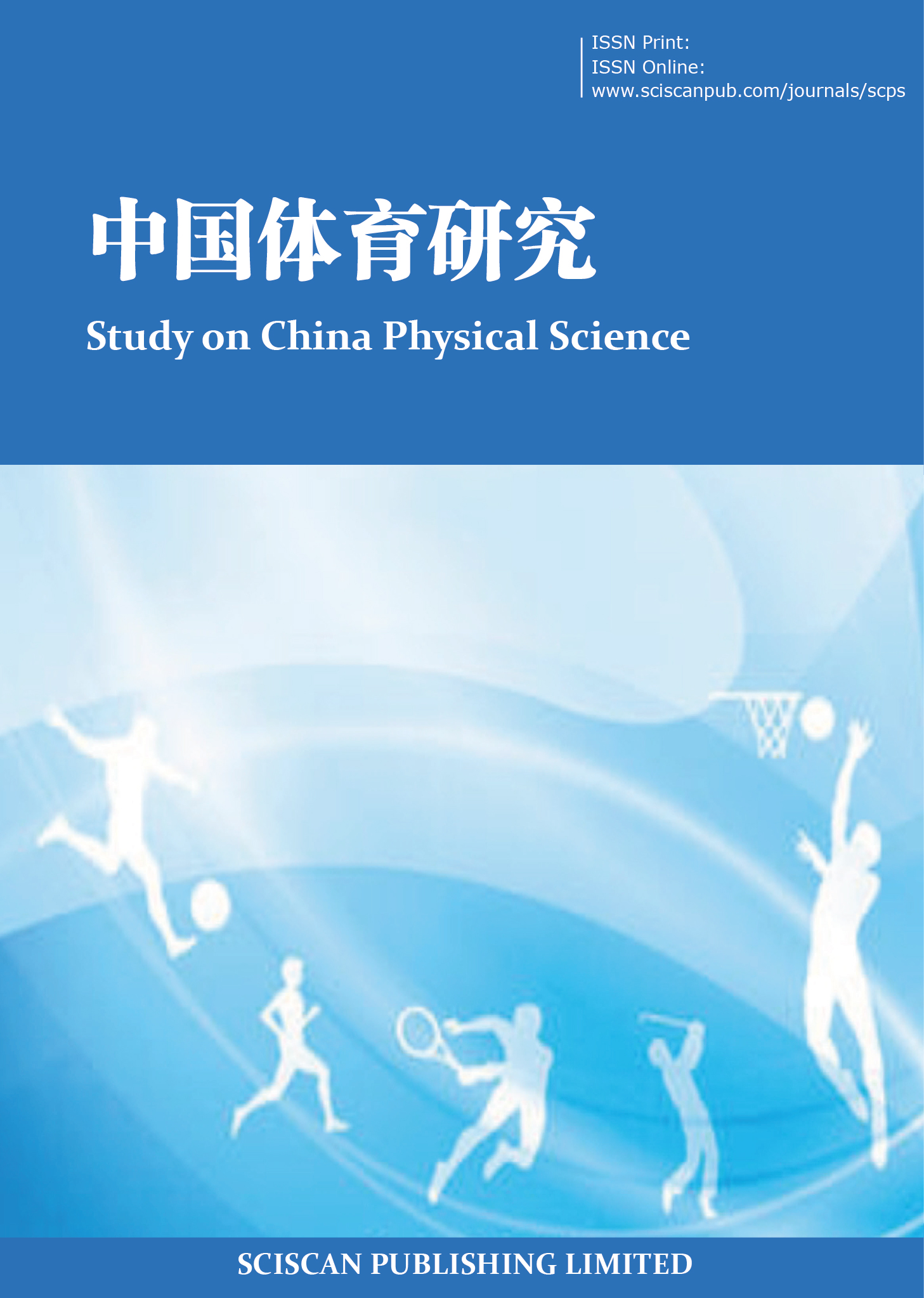Study on China Physical Science
美育与体育相结合的大学体育教学模式及其效果研究
A Study on the Integration of Aesthetic Education and Physical Education Teaching Models in Universities and Their Effects
- Authors: 黄少青 王国谱 王静 闫小乐
-
Information:
同济大学体育部,上海
-
Keywords:
Karate Teaching; Aesthetic Education; Physical Education Teaching Model; University Sports空手道教学; 美育; 体育教学模式; 高校体育
- Abstract: This study aims to explore the application and effects of integrating aesthetic education elements into university karate courses within the physical education curriculum. Conducting a semester-long experiment with 220 undergraduate students from Tongji University, the study randomly assigned students into an experimental group and a control group to compare the learning outcomes of two different teaching models. The experimental group received traditional technical training supplemented with the appreciation of world-class karate competition videos and in-depth explanations of the historical and cultural aspects of karate, while the control group participated in regular physical education classes. The results indicated that the experimental group scored significantly higher in both competitive performance and demonstration performance, demonstrating that a teaching model incorporating aesthetic education can effectively enhance students’ technical execution and aesthetic appreciation. This research underscores the importance of aesthetic education in physical education and provides a new teaching model for future sports education. 本研究旨在探讨美育元素与体育教学相结合在大学空手道课程中的应用及其效果。通过对同济大学220名本科生进行为期一学期的实验,本研究将学生随机分为实验组和对照组,比较两种不同教学模式下的学习成效。实验组在传统技术训练基础上增加了世界级选手比赛视频的鉴赏和空手道历史文化的深入讲解,而对照组仅接受常规体育课程。研究结果显示,实验组在竞技表现分和演武表现分上均显著高于对照组,表明结合美育的教学模式能够有效提升学生的技术执行和审美认识。本研究强调了美育在体育教学中的重要性,并为未来体育教育提供了新的教学模式。
- DOI: https://doi.org/10.35534/scps.0504029
- Cite: 黄少青,王国谱,王静,等.美育与体育相结合的大学体育教学模式及其效果研究[J].中国体育研究,2023,5(4):-.
1 引言
本研究深受教育家蔡元培先生百年前关于美育的深刻见解启发,旨在探索并实践美育在体育课堂中的应用。蔡元培先生提出“以美育代宗教”,强调了美育在培养个人情感、提升精神境界上的重要作用,以及对于个性全面发展和人格完善的积极影响。本研究基于此观点,试图将空手道这一富含文化内涵的体育运动与美育元素相结合,探索一种新的教学模式,以期在学生的体能训练之外,更加注重其审美能力和道德情操的培养,从而促进学生全面成长[1]。体育教育一直在大学课程中扮演着关键角色,不仅有助于学生的身体健康,还培养了团队协作、领导能力和坚韧不拔的品质。然而,教育不仅仅是传授动作和规则的过程,还应该涵盖技能和运动规则所蕴含的审美观、艺术感知和创造性思维等美育元素。这种综合性的教育方法有望为学生提供更丰富的体验,促进他们的全面发展。因此,本研究的目标在于探索将传统空手道的美育元素融入大学体育教学的空手道课堂模式中,并评估其效果。
体育和美育在教育中的重要性已被广泛认可。体育教育有助于学生建立身体健康的生活方式,培养纪律和团队合作能力,同时也提供了锻炼自我管理技能的机会。然而,这两个领域的整合并不常见,大多数体育教育着眼于动作技能的训练,而美育通常被剥离出教育体系。
为了填补这一教育领域的空白,本研究的核心目标是完善高校空手道公共选修课程体系,创立可操作、可复制的体育美育教学模式。通过更新和完善空手道选修课的教学方法,以体育美育理念为指导,旨在以空手道公共课程为载体,有目的地引入鉴赏空手道世界级选手比赛中的型视频和组手视频以及更深入把空手道技战术背后的武道历史文化的美育相关内容进行讲解,试图将传统空手道的美育元素融入大学体育空手道课堂当中。鉴赏世界级选手比赛的空手道型和组手视频提供了视觉艺术的欣赏和理解,而武道的历史文化则强调精神修养和自我控制。这不仅传授大学生运动技术相关的知识、增强他们的身体健康,还增进其对自身内在、外在的感知能力和对抗中斗智斗勇的技战术的审美,引导他们在空手道运动中发现并享受运动的乐趣。
为了评估这一教学模式的效果,本研究进行了一项实验,将学生分为两组:一组接受传统高校体育空手道课堂中注重体能和技战术的空手道教学,另一组接受传统空手道历史美育内容与体育相结合的教育。我们以期末教师评分为主要因变量,包括动作标准度和其他拟定的评定标准。通过比较两组学生的表现,旨在确定将传统空手道的美育元素融入体育教学是否对学生的体育技能和美育素养产生积极影响。
最后,我们将在讨论部分详细探讨实验结果,强调效果良好的发现,同时讨论可能存在的不足之处和改进的机会。我们相信,这项研究的成果将为今后的体育教育提供新的启示,帮助创造更丰富、更综合的教育体验,促进学生全面发展。通过将传统空手道的美育元素融入体育教育,我们有望培养更具创造力和审美意识的体育教育者和学生。
2 实验方法
2.1 实验内容
实验对象:本研究于同济大学6个空手道公共课班级开展,共涉及220名本科生,每个班级容量约为36人。6个班级被随机分为实验组和对照组,每组包含3个班级,实验组110人,对照组110人。
实验操作:在实验组的空手道课程中,除了常规的体育课程训练内容,还特别增加了观赏世界级选手比赛中的型视频和组手视频,以及深入的讲解其中背后的历史文化美育的相关内容,包括强调精神修养、自我控制和体育道德的培养等。对照组的课程结构则保持了传统空手道训练的形式。对照组、实验组教学内容对比:(1)传统热身(15分钟):通过轻松跑步、关节活动以及基本的空手道体位动作进行身体热身;(2)基础拉伸(10分钟):进行全身拉伸,以提升柔韧性并预防运动中的伤害;(3)技术复习(15分钟):复习上节课学习的空手道技术和组合;(4)新技术学习(20分钟):教授新的空手道技巧,如不同的拳法、脚法和防守技巧,并通过与同伴练习来加强技术的实战应用;(5)体能训练(20分钟):进行专门设计的体能训练,包括力量、耐力、速度和反应训练,以增强学生的整体体能,从而提升技术执行的精确性和力量;(6)拉身和反思
(10分钟):在课程结束前进行身体放松拉伸,并在教师的引导下反思学习内容。
这种对比实验设计的目的是观察引入世界级选手比赛视频鉴赏和历史文化教育元素的教学方法是否能显著提升学生的技术能力、文化理解和道德修养。通过这样的教学方法,可以培养出在技术上更加出色,同时在精神文化层面也更深厚的空手道学习者。
实验组的空手道课程中,除了常规的技术训练,还特别增加了一些内容:(1)历史文化美育讲解:每堂课在开始时,作为课程引导的一部分,教师会结合空手道的历史和文化背景简要介绍本节课的目标和任务,旨在开阔学生的学习视野;(2)世界级选手型视频鉴赏:在技术教学环节,教师会展示顶尖选手的型比赛视频,这不仅使学生能够直观地看到技术的标准执行,还帮助他们理解技术动作的精髓和艺术表达;(3)组手视频观赏:在实战技术的讲解和练习前,学生们会观看世界级选手的组手视频,学习在实战中如何有效运用技术和策略;(4)精神修养讲解:教师会在适当的时刻,尤其是在困难和挑战性练习之后,强调武道精神的重要性,以帮助学生在挑战中保持耐心和决心;
(5)自我控制训练:在课程的中间休息或准备进行对练之前,教师会通过冥想和呼吸控制练习指导学生如何管理情绪和压力;(6)体育道德讨论:在学生进行对练时,教师会利用这个机会强调安全意识和体育道德,如尊重对手和公平竞赛的重要性。
这种教学流程不仅确保了空手道传统技术训练的充分性,而且将文化教育和道德讨论巧妙地融入课程中,让学生在学习技术的同时,也在学习和实践空手道的精神和哲学。
2.2 数据测量及分析
学期末教师对学生表现进行评分,根据表1标准评定每个学生的两项分值。
2.2.1 分值一:竞技表现分,评分细则
进攻积极性(满分3分):(1)先得分优势(1分):学生在比赛开始时展示出的攻击性和能够抢先得分的能力,包括快速反应和主动进攻;(2)战术智慧(1分):在得分机会相等时,能够利用战术智慧和规则空间获取“先取SENSHU”优势的学生;(3)、持续进攻(1分):整场比赛中始终保持进攻态势,不依赖于单次领先优势,而是持续寻找得分机会的行为。
专注力(满分3分):(1)无防备状态(1分):评估学生在比赛中的注意力分配,能够在防守时避免出现疏忽导致的无防备状态;(2)战斗警惕性(1分):在进攻后,学生是否能够快速回到防守状态,保持对对手动向的警惕性;(3)反应与应变(1分):学生对对手攻势的反应时间和处理紧急情况的能力,包括在压力下的应变能力。
竞技道德(满分4分):(1)诚实与公正(2分):学生在比赛中的诚实程度,不夸大伤情或使用任何欺骗手段来影响裁判决策;(2)尊重对手(1分):展现出对对手的尊重,包括比赛前后的礼节和比赛中的行为;(3)遵守规则
(1分):在比赛中遵守规则和指导原则,不试图通过任何非法手段获得不正当优势。
2.2.2 分值二:演武表现分,评分细则
步法与技法(满分3分):(1)步法的流畅性(1分):评估学生在演武时步法的流畅性,步法是否自然而且与整个表演融为一体;(2)技法的精确性(1分):观察学生执行技法的精确度,技法是否按照传统标准准确无误地执行;
(3)步法与技法的配合(1分):步法和技法是否协调一致,展示出技术熟练度和身体协调性的美学。
动作转换与时机(满分3分):(1)动作的连贯性(1分):学生在演武中动作转换的连贯性,动作是否顺畅无断点;(2)时机的把握(1分):学生对动作时机的掌控能力,动作的开始和结束是否恰到好处;(3)适时应变(1分):在表演中对不可预见情况的适时应变能力,以及能否在动态中保持技术的准确性和美感。
呼吸、专注力与一致性(满分4分):(1)呼吸的同步(1.5分):评估学生是否能在演武中保持呼吸与动作的同步,呼吸是否有助于动作的力量和稳定性;(2)精神集中(1.5分):学生在演武过程中的专注程度,注意力是否集中,是否能够排除干扰,保持专注;(3)动作的一致性(1分):学生展示的动作是否与教授的基本功和流派风格有一致性。
以上细化的评分标准旨在更精确地测量和反映学生的表现,并且与他们在课程中所学习到的知识和技能相对应。这种详细的评分方法有助于教师更准确地评估学生在课程结束时的实际水平,并提供更具体的反馈。
最终数据中,剔除成绩不及格或有缺勤记录学生的数据,保留实验组对照组各100人为有效数据,使用SPSS进行独立样本t检验。
表1 空手道期末美育测评指标
Table 1 Evaluation index of karate aesthetic education at the end of the term
|
分值一:竞技表现分 |
|||
|
项目名称 |
项目标准 |
审美体现 |
|
|
进攻积极性 |
先得分优势 |
如果双方得分相同,但一方获得“先取SENSHU”,则该选手判定为胜者 |
公平竞技,胜负由技术和机会决定 |
|
边裁和主裁投票 |
如果一回合结束时,无人得分或得分相同,比赛结果由四位边裁和主裁投票决定 |
裁判员和选手的合作,共同维护比赛公平 |
|
|
判定胜负 |
根据选手表现的态度、斗志、力量,战术和技巧,以及哪位选手主动进攻来判定胜者 |
要求选手展现出坚韧的意志和道德高地 |
|
|
专注力 |
无防备 |
无防备是由选手自身的过失或疏忽引起的,可能会导致警告或处罚 |
提醒选手保持警惕,培养自律和自我约束的品质 |
|
残心 |
残心是指选手在进攻后继续保持集中、观察和警惕的状态,以区别于完全停止战斗的状态 |
强调专注、坚持和尊重对手,反映武道的坚韧和忍耐 |
|
|
竞技道德 |
夸大伤情 |
夸大伤情以欺骗裁判的行为被视为不正当,可能会导致额外处罚 |
道德操守和诚实竞技的重要性 |
|
分值二:演武表现分 |
|||
|
项目名称 |
项目标准 |
审美体现 |
|
|
步法与技法 |
步法的流畅性与技法的精确性 |
展示技术熟练度和身体协调性的美学 |
|
|
动作转换与时机 |
动作的连贯性与时机的把握 |
表现对动作节奏和应变能力的敏感性 |
|
|
呼吸、专注力与一致性 |
呼吸的同步、精神集中及动作的一致性 |
反映内在平静、专注和对传统的尊重 |
|
3 实验结果
t检验结果见表2,实验组与对照组t检验结果表明,在两项分值上p值均小于0.001,两项分值组间差异显著。各组均值及标准差见表3,对于分值1,M实验=7.81,M对照=7.44,实验组得分显著高于对照组。对于分值2,M实验=8.35,M对照=8.10,实验组得分显著高于对照组。两项分值上各组置信区间与均值图见图1。
表2 t检验结果
Table 2 t test results
|
t |
df |
p |
|
|
分值1 |
3.71 |
198 |
<0.001 |
|
分值2 |
4.20 |
198 |
<0.001 |
表3 实验组与对照组分值平均值与标准差
Table 3 Mean and standard deviation of scores of the experimental group and the control group
|
分值1 |
分值2 |
|||
|
实验组 |
对照组 |
实验组 |
对照组 |
|
|
平均值 |
7.81 |
7.44 |
8.35 |
8.10 |
|
标准差 |
0.69 |
0.69 |
0.51 |
0.32 |

图1 两项分值上各组置信区间及均值
Figure 1 Confidence intervals and mean values of each group on the two scores
4 讨论
本研究旨在探讨美育元素与体育教学相结合在大学空手道课程中的应用及其效果。实验结果表明,在引入世界级选手比赛视频鉴赏和深入讲解空手道的历史文化美育内容后,实验组学生在竞技表现分和演武表现分上均显著高于对照组,这支持了我们的假设,即结合美育与体育的教学模式能够有效提高学生的技术执行和审美认识。
在竞技表现方面,实验组学生在期末考试中展示出更高的进攻积极性、更好的专注力和竞技道德。这可能是因为学生通过观看顶尖选手的比赛,能够更好地理解空手道的技术和战术,并在实战中运用所学。同时,空手道的历史文化教育增强了学生对武道精神的理解,促进了他们在比赛中的道德表现。
在演武表现方面,实验组的学生在步法与技法的流畅性、动作转换与时机的掌握以及呼吸、专注力与一致性方面均得到了提高。这表明,通过美育与体育的结合教学,学生能够更加注重技术的艺术性和表现力,而不仅仅是技术的机械重复。
然而,本研究也存在一些局限性。首先,研究样本限于一个大学的空手道课程,可能无法完全代表所有大学生的体验。其次,研究仅使用期末教师评分作为评价标准,没有考虑学生的主观体验和长期效果。未来的研究可以通过长期跟踪和多元化评价方法来克服这些限制。
综上所述,本研究提供了将美育与体育结合的大学体育教学模式的有效性证据。这一发现对于体育教育领域具有重要启示,强调了美育在体育教学中的价值,并提供了一个可行的教学模式示范。随着教育者和学生对教育质量的不断追求,这种综合教学方法可能会成为未来体育教学创新的重要方向。
5 结论
本研究证明了美育与体育相结合的教学模式能够在大学空手道教育中显著提升学生的技术性能和审美素养。通过实验组和对照组的对比分析,结果支持了结合美育元素的教学方法能够有效地提高学生的竞技和演武表现。这种教学模式为传统体育教育提供了新的视角,推动了体育和美育领域的有机融合。未来的研究可以进一步探索这种教学模式在不同体育项目中的应用,以及其对学生个人发展的长期影响。
参考文献
[1] 蔡元培.以美育代宗教说[N].新青年,1917(6).
[2] D Chatziefstathiou,E Iliopoulou,M Magkou.UrbanDig项目:共同创造城市空间的体育实践和艺术干预[J].社会中的体育运动,2019,22(5):871-884.
[3] Wenceslao Garcia-Puchades,Oscar Chiva-Bartoll.A Philosophy of Physical Education Oriented toward the Game as an Object:Showing the Inexhaustible Reality of Games through Bernard Suits’ Theory[J].Sport,Ethics and Philosophy,2020,14(2):192-205.
[5] 王勇.普通高校体育舞蹈课美育教法新探:社会学视角下体育舞蹈教学的美育实践[J].北京体育大学学报,2016(7):102-107.
[6] 霍军.体育教学方法实施及创新研究[J].北京体育大学学报,2013,36(1):84-90.
[7] 胡小明,黎文坛.论民族体育的审美价值[J].北京体育大学学报,2011,34(10):1-2.
[8] 陈济川.新世纪我国大学生体育审美教育的研究[J].北京体育大学学报,2005,28(4):527-529.
[9] 王岗,陈保学.中国武术美学精神论略[J].上海体育学院学报,2019,43(2):103-110.
















